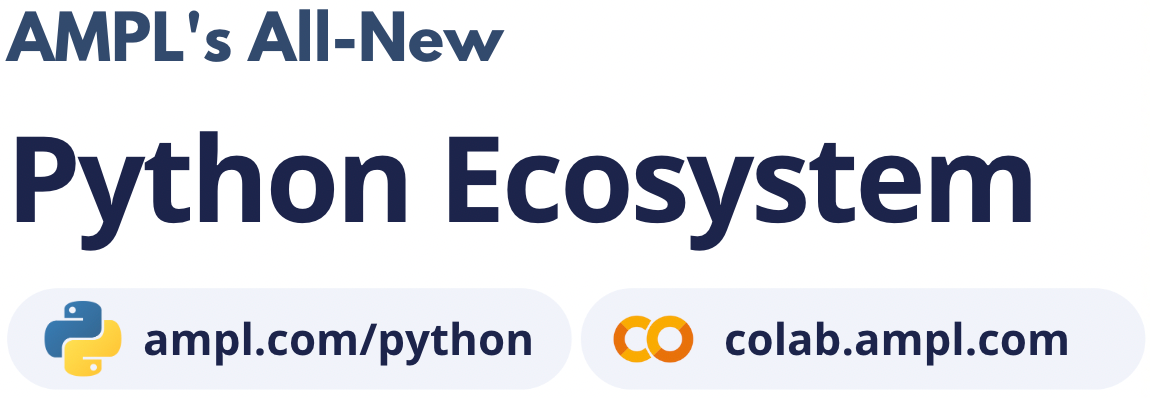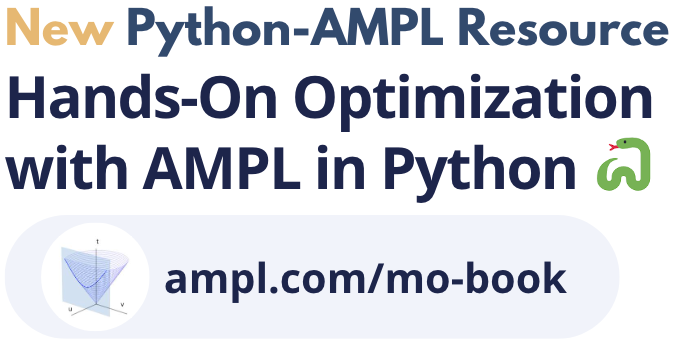Nonlinear transportation problem example#
Description: book example autogenerated using nltransd.mod, nltrans.dat, and nltrans.run
Tags: ampl-book, nonlinear, ipopt
Notebook author: Marcos Dominguez Velad <marcos@ampl.com>
Model author: N/A
# Install dependencies
%pip install -q amplpy pandas numpy
# Google Colab & Kaggle integration
from amplpy import AMPL, ampl_notebook
ampl = ampl_notebook(
modules=["coin"], # modules to install
license_uuid="default", # license to use
) # instantiate AMPL object and register magics
Nonlinear transportation model#
This is a variation of the linear transportation model presented on the Chapter 3 of the AMPL book, containing a nonlinear objective. There are a set of origin nodes, and a set of destination nodes (net model).
Sets:
ORIG: origin nodesDEST: final nodes
Parameters:
supply {ORIG}: available units at originsdemand {DEST}: required units at destinationslimit {ORIG,DEST}: maximum capacity on routes between two nodesrate {ORIG,DEST}: base shipment costs per unit
Variables:
Trans {ORIG,DEST}: units to be shipped
Objective: minimize total cost (nonlinear)
The bigger the Trans[i,j] value, the closer to limit[i,j] (upper bound) so denominator tends to \(1-1=0\) implying high costs.
Constraints:
Supply {ORIG}: node ships units equal to supply capacity:
\[\sum \limits_{j \in DEST} Trans[i,j] = supply[i]\]Demand {DEST}: node gets units equal to demand:
\[\sum \limits_{i \in ORIG} Trans[i,j] = demand[j]\]
Remark: as the objective function is highly nonlinear, some bounds are fixed in order to help the solver and getting a consistent solution. The first guess for variables is away from zero in 0.5*limit[i,j].
%%writefile nltrans.mod
set ORIG; # origins
set DEST; # destinations
param supply {ORIG} >= 0; # amounts available at origins
param demand {DEST} >= 0; # amounts required at destinations
check: sum {i in ORIG} supply[i] = sum {j in DEST} demand[j];
param rate {ORIG,DEST} >= 0; # base shipment costs per unit
param limit {ORIG,DEST} > 0; # limit on units shipped
var Trans {i in ORIG, j in DEST}
>= 1e-10, <= .9999 * limit[i,j], := 0.5*limit[i,j];
# actual units to be shipped
minimize Total_Cost:
sum {i in ORIG, j in DEST}
rate[i,j] * Trans[i,j]^0.8 / (1 - Trans[i,j]/limit[i,j]);
subject to Supply {i in ORIG}:
sum {j in DEST} Trans[i,j] = supply[i];
subject to Demand {j in DEST}:
sum {i in ORIG} Trans[i,j] = demand[j];
Overwriting nltrans.mod
import pandas as pd
import numpy as np
# ORIG supply data
supply_data = {"ORIG": ["GARY", "CLEV", "PITT"], "supply": [1400, 2600, 2900]}
supply_df = pd.DataFrame(supply_data).set_index("ORIG")
# DEST demand data
demand_data = {
"DEST": ["FRA", "DET", "LAN", "WIN", "STL", "FRE", "LAF"],
"demand": [900, 1200, 600, 400, 1700, 1100, 1000],
}
demand_df = pd.DataFrame(demand_data).set_index("DEST")
rate = np.array(
[
# 'FRA', 'DET', 'LAN', 'WIN', 'STL', 'FRE', 'LAF'
[39, 14, 11, 14, 16, 82, 8], # GARY
[27, 9, 12, 9, 26, 95, 17], # CLEV
[24, 14, 17, 13, 28, 99, 20], # PITT
]
)
limit = np.array(
[
# 'FRA', 'DET', 'LAN', 'WIN', 'STL', 'FRE', 'LAF'
[500, 1000, 1000, 1000, 800, 500, 1000], # GARY
[500, 800, 800, 800, 500, 500, 1000], # CLEV
[800, 600, 600, 600, 500, 500, 900], # PITT
]
)
# Read the model
ampl.reset()
ampl.read("nltrans.mod")
# Load the data
ampl.set_data(supply_df, "ORIG")
ampl.set_data(demand_df, "DEST")
ampl.param["rate"] = rate
ampl.param["limit"] = limit
# ampl.display('ORIG, DEST, supply, demand, rate, limit')
# Solve the problem
# Set iterations limit and time limit for ipopt
ampl.option["ipopt_options"] = "max_iter=100 max_cpu_time=10"
ampl.solve(solver="ipopt", verbose=False)
# Show solution
Total_Cost = ampl.obj["Total_Cost"].value()
print(f"Total cost: {Total_Cost}")
Trans = ampl.var["Trans"].to_pandas()
print(Trans)
Total cost: 354280.4809582299
Trans.val
index0 index1
CLEV DET 586.432409
FRA 292.093029
FRE 365.334291
LAF 488.917726
LAN 298.728286
STL 469.182376
WIN 99.311883
GARY DET 191.798629
FRA 75.168128
FRE 370.169674
LAF 0.086271
LAN 0.022464
STL 762.744843
WIN 0.009992
PITT DET 421.768962
FRA 532.738843
FRE 364.496035
LAF 510.996003
LAN 301.249250
STL 468.072781
WIN 300.678125
The solver ipopt reached maximum number of iterations while searching for the optimal solution, so the status of the problem is not ‘solved’, but ‘limit’. This can be checked through the attribute: ampl.solve_result
assert ampl.solve_result == "limit", ampl.solve_result





